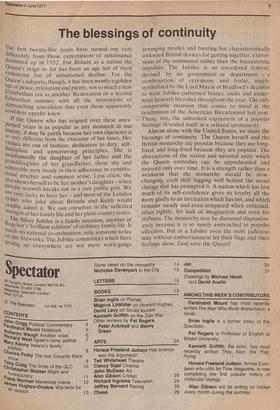The blessings of continuity
The first twenty-five years have turned out very differently from those expectations of renaissance drummed up in 1952. For Britain as a nation the Queen's reign so far has been an age not of stern endeavour but of unbuttoned decline. For the Queen's subjects,though, it has been mostly a golden age of peace, relaxation and plenty, not so much a new Elizabethan era as another Restoration or a second Edwardian summer with all the intimations of aPproaching convulsion that even those apparently Confident epochs knew. If the Queen who has reigned over these unexPected years is as popular as any monarch in our history, it may be partly because her own character is So very different from the character of her times. Her virtues are out of fashion: dedication to duty, selfdiscipline and unwavering principles. She is unashamedly the daughter of her father and the granddaughter of her grandfather, those shy and admirable men steady in their adherence to constitutional practice and common sense. Less often, she also shows herself to be her mother's daughter — when Private warmth'breaks out in a rare public grin. We are very lucky to have her — and most of the London Cynics who joke about Brenda and Keith would readily admit it. We sun ourselves in the reflected strength of her family life and her plain country tastes. The Silver Jubilee is a family occasion, another of uagehot's 'brilliant editions' of ordinary family life. It needs no national co-ordination, only someone to lay o s n the fireworks. The Jubilee committees which have Prung up everywhere are not mere work-gangs arranging trestles and bunting but characteristically awkward British devices for getting together, expressions of the communal rather than the bureaucratic impulses. The Jubilee is an unordered festival, devised by no government or department — a combination of ceremony and frolic, nicely symbolised by the Lord Mayor of Bradford's decision to wear Jubilee-patterned braces, socks and underwear beneath his robes throughout the year. The only comparable occasion that comes to mind is the celebration of the American Bicentennial last year. There, too, the unbroken enjoyment of a popular heritage revealed itself in a relaxed spontaneity.
Almost alone with the United States, we share the blessings of continuity. The Queen herself and the British monarchy are popular because they are longlived, and long-lived because they are popular. The abstractions of the nation And national unity which the Queen embodies can be apprehended and enjoyed only over time. It is a strength rather than a weakness that the monarchy should be slowchanging, each shift lagging well behind the social change that has prompted it. A nation which has lost much of its self-confidence gives its loyalty all the more gladly to an institution which has not, and which remains steady and even-tempered when criticised, often rightly, for lack of imagination and even for stiffness. The monarchy may be discussed dispassionately because it is so surely entrenched in popular affection. But at a Jubilee even the moSt judicious may without embarrassment let their flags and their feelings show. God save the Queen!


































 Previous page
Previous page